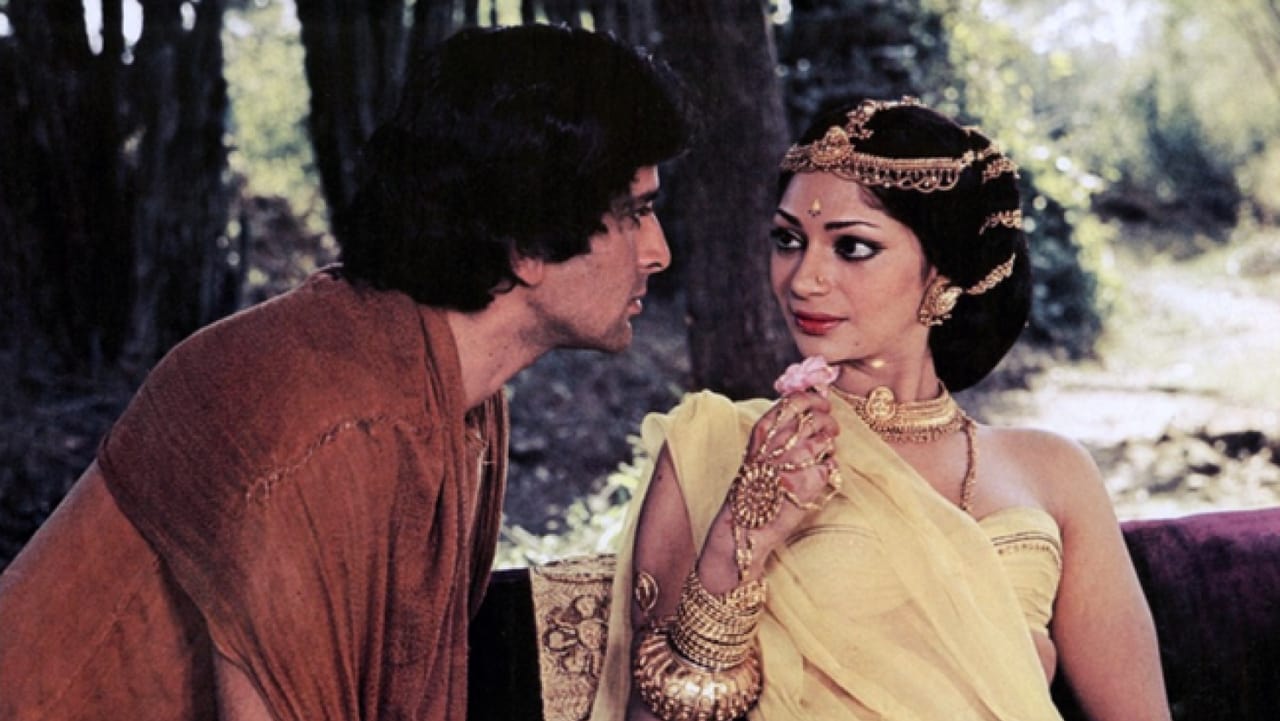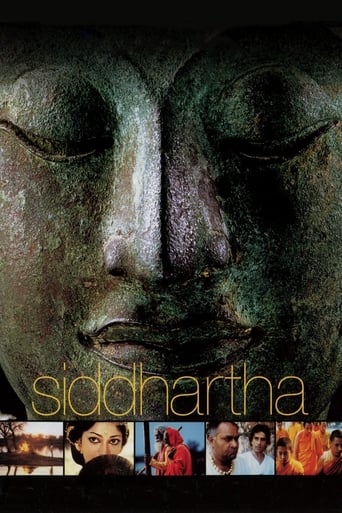

Excellent, a Must See
... View MoreThe first must-see film of the year.
... View MoreA great movie, one of the best of this year. There was a bit of confusion at one point in the plot, but nothing serious.
... View MoreGreat example of an old-fashioned, pure-at-heart escapist event movie that doesn't pretend to be anything that it's not and has boat loads of fun being its own ludicrous self.
... View MoreI have always been very interested in the life of the Buddha, so I was looking forward to this movie. It was quite a disappointment. The movie was made in 1972, modelling the fortune cookie, stilted dialogue from Charleton Heston in The Ten Commandments, Richard Burton in The Robe, and presaging Alec Guiness as Obi-Wan Kenobi in Star Wars. The beauty of the movie is the misty panoramas of the quiet river. It such a beautiful peaceful world prior to the invention of machines. The crude makeup to show Siddhartha ageing reminded me of many a Monty Python sketch. There are some embarrassing long sex scenes. I left the room. They just felt cheap and tacked on porn, only marginally to do with the flow of the movie. The movie might have worked better with the sound off and subtitles to disguise just how stilted, turgid, corny and idiotic the dialogue is. "Everything returns" is passed off as transcendental wisdom.
... View MoreIts been years and years since I read the book in school. Which for me was a big deal cause I never read any of the books they assigned. But for some reason I read this and it was probably the first book I ever read cover to cover that wasn't a comic. I can remember always liking the story and it has stayed with me all these years. I rented this as a DVD recently never knowing that there was even a film adaptation. Im glad I did. For me it was everything I remembered feeling when I read the book. I cant really speak to whether it is a faithful representation of the book at this point but I can tell you that it is absolutely faithful to the spirit of the it.The film is very elegant and the story remains relevant and inspiring. It is beautifully shot and scored. The one problem with the film was the editing. It tends to be choppy and disruptive to the continuity of the story. It also jumps drastically forward in time at several points. If you have read the book than its not really a problem but for someone who has not it may be.Even at 1 hour and 20 minutes the film still feels epic in scope as it explores Siddharthas lifelong journey to find life's meaning and ultimately delivers a timeless message about the nature of the human condition.There is No Gene for the Human Spirit.I Can Think, I Can Wait and I Can Pray.
... View MoreNo movie that is even marginally true to the story that Nobel Prize-winning German author Hermann Hesse told in his novel Siddhartha (1951) is without merit; and this modest film is no exception. The problem is, that while Conrad Brooks, who wrote, directed and produced the film, is true to the storyline of the novel and even in some respects true to the spirit of the novel, he fails to bring the power and the resplendence of Hesse's philosophic and spiritual masterpiece to the screen.What made the novel one of the best ever written is the character of Siddhartha himself. Patterned after the Buddha both in temperament and in experience, Hesse's Siddhartha, "the Accomplished One," grew up amid extravagant wealth and privilege only to dump it all in an effort to find himself. Brooks fails almost immediately when he leaves out the scene from the book in which the young Siddhartha, not wanting to directly disobey his father (and to demonstrate his resolve) stands up all night waiting patiently for his father's permission to leave their splendid estates. This is one of the great "coming of age" scenes ever written and an early insight into Siddhartha's strength of character, but Brooks gives it barely a notice! Also skirted over too quickly are Siddhartha's years with the samanas in the forest where he practiced meditation and austerities. This part of Siddhartha's life was essential in making him the man he was and in showing us his character. He spent six years with the shamans and gurus of the forest (along with his companion Govinda) and in the end learned everything they knew and more, and yet had not found the answer he sought. (This parallels the experience of the "emaciated" Buddha.) Brooks does do the meeting with the Buddha well, having us hear his voice but not see him, and then follows that up with Siddhartha's reasons for not following the Buddha, even though he finds no fault with the Enlightened One's teachings. Note that without his actually meeting the Buddha, the life of Siddhartha (which is one of the traditional names of the Buddha) would so closely parallel that of the Buddha that some people might think that Hesse had written a profane life of the Buddha, which might not set well with some Buddhists! (Of course we all have the Buddha nature.) Siddhartha's life with the courtesan Kamala and the merchant Kamaswami and his spiral into debauchery and sloth is well depicted, although again the ultimate disillusionment that Siddhartha experienced is not as well presented as in the novel. Which brings me to Shashi Kapoor who plays Siddhartha. Although he would go on to be the veteran of well over a hundred films, and although he is appropriately enough Indian as well as tall, dark and handsome and a good actor, he fails to evoke the passion that Siddhartha must have. Siddhartha felt everything in a profound manner, even boredom was profoundly experienced by the Brahmin's prodigal son. Kapoor, especially near the end of the film when he plays an old man, occasionally made me feel that he could be "the Accomplished One," but more often he made me feel that he was holding something back.Finally, the poetic scene near the end of the novel when, after living with and being guided by Vasudeva, the ferryman, Siddhartha becomes one with the river and falls spiritually into its wisdom, is only a bland shadow of what appears in the novel! Part of the reason for the failure probably has to do with a limited budget. The film is 83 minutes long, but could easily be twice that long. Part has to do with the selection of scenes and the emphasis on those scenes, and finally part of the reason has to do with the relative inexperience of Brooks who was only directing his second major film (and apparently his last). Certainly the on-location in India cinematography by Sven Nykvist who worked on so many films with Ingmar Berman is not to be faulted. Although not spectacular, Nykvist's camera conveys both the exotic beauty and the poverty of a landscape that could have been India 26 centuries ago.(Note: Over 500 of my movie reviews are now available in my book "Cut to the Chaise Lounge or I Can't Believe I Swallowed the Remote!" Get it at Amazon!)
... View MoreI used to love Hermann Hesse and this book in my teens. Still, I love this film, even because I consider it to be a very appropriate filming.Hesse's characters are mostly soul-searchers wandering around in rather artificial surroundings - which is true in the case of this timeless, ancient India. As he is prone to put all the meaning into lengthy, philosophical dialogues, this makes him utterly difficult to turn into film.This film manages to capture both: the artificiality of the setting as well as the philosophical sincereness - plus that certain naive sense of beauty that makes Hesse so appealing and disgusting at once. A good deal of the films success is due to Sven Nykvist's marvellous camera work, done mostly with natural light. (The few scenes with set light are awful.) The beauty of the landscapes is not only the superficial one of a postcard, but the philosophical one that tells you that a beautiful world is essentially a good, complete, happy world: a world in which you can afford to completely focus on your personal search for meaning and spirituality. Well, personally I don't believe this, but this movie had me suspending my belief for 90 minutes. What a comforting experience.
... View More